Amidst the ongoing challenges brought about by the COVID-19 pandemic, many businesses have relied on the Employee Retention Credit (ERC) as a lifeline to support their struggling workforce. However, delays in receiving these essential refunds have left numerous individuals in a state of uncertainty. Luckily, the Taxpayer Advocate Service (TAS) steps forward as a beacon of hope, offering guidance and assistance to those seeking to secure their ERC refunds without any adverse effects on their future tax returns.
The ERC was established as a pivotal financial aid mechanism for businesses dealing with the economic strains of the pandemic, offering a refundable tax credit for eligible employers based on the wages paid to their employees during specific periods of economic hardship. To qualify for this credit, businesses had to meet certain criteria, such as experiencing a significant decline in gross receipts or being partially or fully suspended due to COVID-19-related government orders. This measure played a crucial role in stabilizing employment levels and mitigating the financial impact of the pandemic, influencing businesses’ financial strategies during and after the crisis.
The Taxpayer Advocate Service (TAS) emerges as a vital wing of the IRS, functioning independently to aid taxpayers facing tax-related challenges that cannot be resolved through conventional IRS procedures. TAS serves as a champion for taxpayers’ rights, providing advocacy and mediation to ensure taxpayers have a voice within the complex tax system. By utilizing TAS’s expertise and intervention, individuals and businesses can navigate the intricate process of claiming refunds such as the ERC more efficiently, ensuring their concerns are addressed and resolved promptly.
To request assistance from TAS regarding ERC refunds, individuals must complete Form 911, titled Application for Taxpayer Assistance Order. This form serves as a formal request for TAS’s intervention and requires detailed information about the specific tax issue you are facing, the type of assistance needed, and why TAS’s involvement is essential. Clearly articulating the hardship caused by the delay in receiving your ERC refund can emphasize the urgency of your request and enable TAS to advocate effectively on your behalf for timely resolution.
TAS’s unique ability to engage directly with IRS operations allows them to prioritize cases, reducing wait times and expediting the processing of ERC refunds. By presenting a comprehensive account of your situation through Form 911, TAS can navigate IRS procedures with precision, pushing for expedited review and processing to resolve any delays hindering your refund. This proactive approach streamlines the process, ensuring your case is not only heard but promptly acted upon, eliminating bureaucratic obstacles to secure your entitled ERC refund swiftly.
In cases where taxpayers face persistent challenges with their ERC refunds, exploring legal action through District Court may offer an alternative pathway. Filing a lawsuit in District Court allows taxpayers to address grievances related to denied or overlooked refund claims, providing a platform for legal scrutiny and resolution. While embarking on this legal journey requires careful consideration and consultation with a tax attorney specializing in tax litigation, it represents a significant escalation in seeking redress for unresolved tax matters. This option underscores taxpayers’ rights to pursue justice through the judicial system, emphasizing the importance of fair tax administration and accountability.













